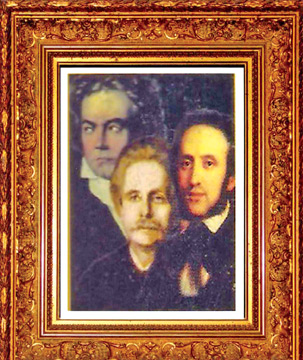The romance of the Romantics
by Gwen Herat
Many artistic works went into the scores of the Romantics who were
sandwiched between the Classical and Modern eras of music. They produced
the world's best known musical scores that remain eternal. They remain
to mesmerise generation after generation. They changed the face of the
music scene of their time and their new compositions simply amazed the
public.
Their skills were so prolific and contained spectacular talent.
Everybody experienced the development of music that nothing was left for
imagination. Some philosophers found their ethics as never before and
the imagery that floated before their eyes were central to the human
heart.
|

Three electrifying Romantics who led the rest, Mendelssohn
(1809-1847), Greig (1843-1907) and Beethoven
(1779-1827). |
The Romantics turned around nations as their notes and rhythms
floated in the air.
Sounds
They heard those sounds in the rippling waters, torrential rains,
thunder and lightning, when birds sang atop trees and in one particular
instant, in the ripples of a lake that the great Tchaikovsky turned into
a magnificent suite for the Swan Lake.
The better part of the Romantics emerged from 1800 when Italy had
dominated the musical world of the 17 and 18 centuries with many great
operas and violinists.
The centre of music moved over to Vienna with the court in focus and
influenced Germany and Bohemia. Romanticism was taking wings across
Europe like a sweeping wind, gathering momentum.
With the French Revolution as a backdrop, people were feeling the
aura of opera and symphonies. The aspirations of man which were the
theme, the Romantic composers sharply dwelt into their hearts.
The first such person they came face to face was Italian Vincenzo
Bellini (1801-35) who headed the list of Early Romantics that led the
High Romantics list with the Czech, Leos Janacek (1854-1928).
And to the whole universe the bewildering array of composers looked
as though God Himself dropped them from the star-spangled heaven. They
appeared to be a virtuostic gift from the Creator.
The amazing feature of the Romantic era was the discovery of the new
iron-string piano that took over the rest of the instruments of the era.
It helped to produce the iconic pianist/composer combination and
among them were Liszt, Chopin, Schumann and Mendelssohn.
Of course, the best of the four, Mendelssohn seized on the elegance
and traditional structures of Classicism only to be followed by the
oncoming generation of Romantics. As the iron-strung piano gathered
momentum, Chopin became the undisputed master on its keyboard style.
Even half a century after his death and as early as 1849, composers
continued to write scores heavily influenced by his Nocturne and
Barcarole.
Romanticism
The birth of Romanticism superceded all other eras as it produced the
most talented spectacular composers the world, was to witness. While
every era put together enhanced the cultural history of each and every
country, some eras overlapped the others but musicologists have been
able to assemble them to span over a thousand years.
Early music (1000-1200), Medieval (1200-1450), Renaissance
(1450-1600), Baroque (1600-1750), Classical (1750), Early Romantic
(1800-1850), High Romantic (1850-1910) and Modern (1900- to present).Of
the elements, we witnessed the invention of compositions, the birth of
harmony and of modern musical notation.
 To feel the full impact of Romantic era music, we have to take a
closer look at three outstanding composers who dominated the musical
world in the third quarter of the 19th century and took it over to the
next century. They were Liszt, Wagner and Berlioz. To feel the full impact of Romantic era music, we have to take a
closer look at three outstanding composers who dominated the musical
world in the third quarter of the 19th century and took it over to the
next century. They were Liszt, Wagner and Berlioz.
They were responsible in the creation of symphonic poem and solo
piano recital.
Musical genius
It made Liszt the most influential musical genius of the century.
Liszt's Faust Symphony relied on literary inspiration for its structure.
The egocentric Wagner, intelligent, industrious and arrogant was the
third giant composer of all time. Richard Wagner's Der Ring Des
Nibelungen which was a cycle of four operas was such a mighty
achievement that turned form the realm of classicism to quasl-religious
experience. When the score was completed, Wagner called it his vision of
‘music-drama'.A strong believer that music should grow from the libretto
and should contain no arias but should have a narrative-flow and never
cease. He was a great reformer and the composers of his time who found
it difficult to keep pace with him on this theory, later seized on his
harmonic-language in the use of chromaticism.
But not all composers fell under Wagner's spell, especially the
German Romantics. Giuseppe Verdi adopted some of the Wagner style only
in his old age. One thing that tied Wagner to Verdi in common was their
fierce patriotism and remained to date as the great miracles of music.
Of all the phases in music history, Romanticism remains the best
giving the world the world best Romantics, ever.
|

